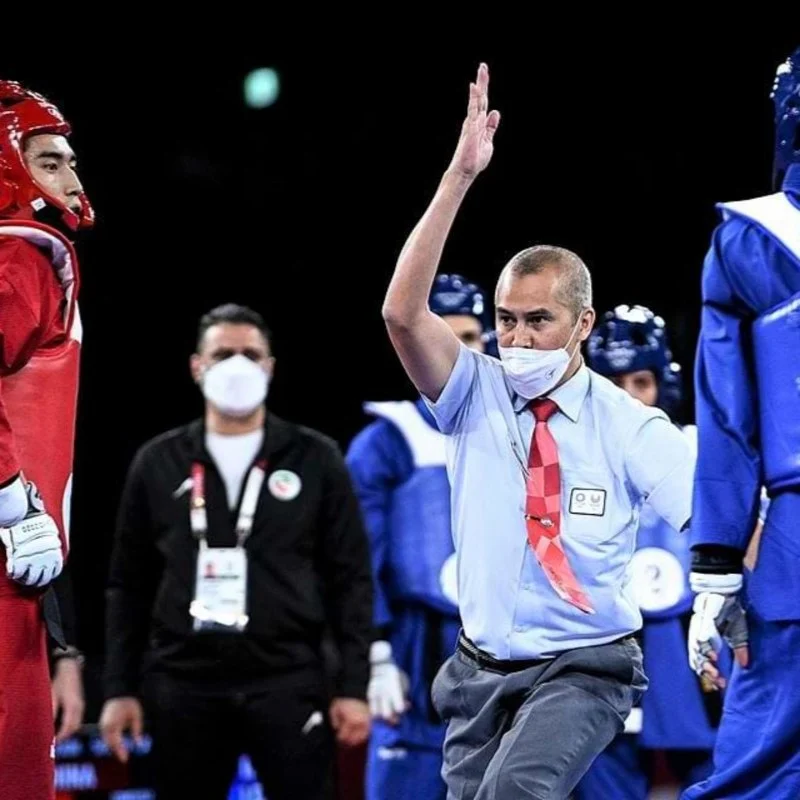
- Understanding the Role of the Referee
- Duties of a Tae Kwon Do Referee
- Ensuring Fairness in a Tae Kwon Do Match
- Referee Training and Certification
- Challenges Faced by Tae Kwon Do Referees
1. Understanding the Role of the Referee
In every Tae Kwon Do competition, the referee plays a vital role in ensuring the match is conducted fairly, safely, and according to the rules. The referee's responsibilities extend beyond just calling points; they are tasked with maintaining order, ensuring athletes' safety, and enforcing the integrity of the sport.
Tae Kwon Do is a martial art that emphasizes both precision and discipline, and the referee is there to make sure that the rules are followed correctly. Their decisions can impact the outcome of a match, which places great responsibility on their shoulders. A skilled and impartial referee is crucial to the overall experience of both the competitors and the spectators.

Red Dragon Karate Glendora / red dragon glendora
GlendoraLos Angeles CountyCalifornia
1826 E Rte 66, Glendora, CA 91740, USA
2. Duties of a Tae Kwon Do Referee
A referee in a Tae Kwon Do match is responsible for a variety of tasks, all of which help to ensure the match proceeds smoothly and fairly. The key duties of a Tae Kwon Do referee include:

Monmouth Karate Academy / monmouth karate academy
Marlboro TownshipMonmouth CountyNew Jersey
300 Campus Dr Suite E, Morganville, NJ 07751, USA
2.1 Starting and Stopping the Match
One of the primary duties of a referee is to initiate the match by signaling the start and stop of the rounds. The referee must ensure that both competitors are ready before starting the match, and they must also stop the match at the appropriate times, such as when there is an injury or a foul.
2.2 Scoring Points
Referees are responsible for evaluating and awarding points based on the execution of techniques during the match. Points are typically awarded for successfully executed strikes, kicks, and other techniques that meet the required criteria for points in Tae Kwon Do. The referee must quickly and accurately assess the quality of each action.
This includes ensuring that all techniques are legal and that points are awarded according to the competition rules. For instance, a point might be given for a clean, controlled kick to the opponent's chest or head.
2.3 Enforcing the Rules
The referee ensures that all participants adhere to the official rules of the competition. This includes enforcing the boundaries of the competition area, monitoring the conduct of the competitors, and issuing penalties for any fouls, such as illegal hits or unsportsmanlike behavior.
Referees also play a role in ensuring that the match progresses at an appropriate pace, preventing unnecessary delays or stalling tactics. They must keep a close eye on the competitors and act decisively when necessary.
2.4 Ensuring Safety
Ensuring the safety of the participants is one of the most important roles of a referee in Tae Kwon Do. If a competitor is injured or if the match becomes too dangerous, the referee must stop the fight and assess the situation. In extreme cases, the referee may decide to disqualify a competitor to prevent further harm.
Referees must also be knowledgeable about the rules governing illegal actions such as excessive force, attacks to prohibited areas, or dangerous techniques that could lead to injury.
3. Ensuring Fairness in a Tae Kwon Do Match
A fair match is the cornerstone of any martial arts competition, and the referee is the key figure in maintaining this fairness. The referee must ensure that both competitors are treated equally, that the rules are applied consistently, and that any disputes are handled impartially.
This means that the referee should be unbiased, not favoring one competitor over the other based on factors like experience, appearance, or popularity. They must remain neutral and focused on the integrity of the match itself.
Additionally, referees must be vigilant in watching for instances of foul play or cheating, such as intentionally injuring the opponent or avoiding the rules of scoring. By staying vigilant and fair, the referee ensures that the competition remains an honest and transparent contest of skill.
4. Referee Training and Certification
To ensure that referees are equipped to handle the responsibilities of their role, many Tae Kwon Do organizations and federations require referees to undergo rigorous training and certification. This training covers the rules of the sport, techniques for judging, and how to manage a match effectively.
Referees must also develop strong communication skills, as they need to interact with competitors, coaches, and other officials during the course of a match. Ongoing education and experience are essential for becoming an expert referee capable of managing the dynamics of a Tae Kwon Do match.
5. Challenges Faced by Tae Kwon Do Referees
Being a referee in a Tae Kwon Do match comes with its own set of challenges. These challenges require referees to remain calm, focused, and confident in their decisions. Some of the common challenges faced by Tae Kwon Do referees include:
5.1 Split-Second Decisions
In the heat of a fast-paced match, referees must make split-second decisions about whether a point is awarded, a foul is committed, or the match should be stopped for safety. This requires quick thinking and a strong understanding of the rules.
5.2 Managing Stress and Pressure
Referees often face stress and pressure from various sources, including competitors, coaches, and the audience. Keeping calm under these pressures is crucial to making fair decisions and ensuring that the match is managed properly.
5.3 Handling Disputes
Disputes may arise during a Tae Kwon Do match, whether it's a disagreement over a scoring decision or a coach's objection to a call. The referee must handle such situations diplomatically, maintaining authority while remaining respectful to all parties involved.
The role of the referee is essential to the success of any Tae Kwon Do match. By ensuring fairness, enforcing rules, and maintaining safety, referees contribute to the integrity of the sport. If you're looking to learn more about Tae Kwon Do and how to improve your skills, visit Jeuns TKD Hub for the best products and resources for your training.

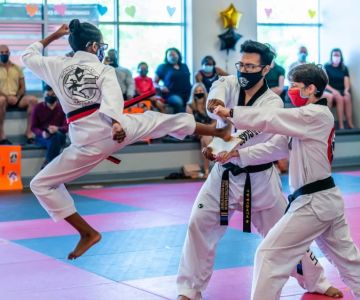
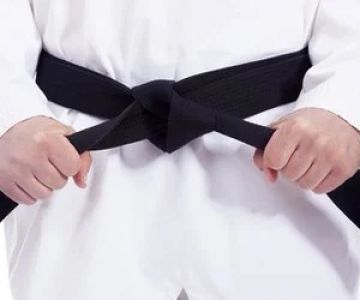
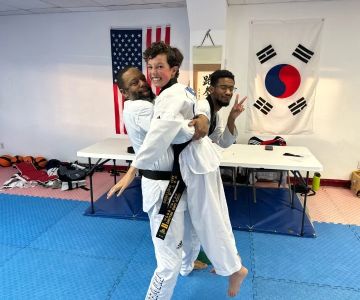

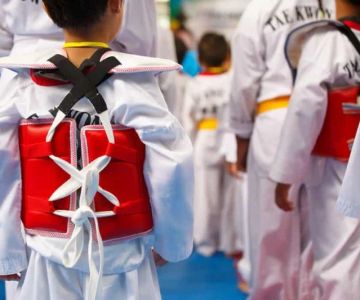
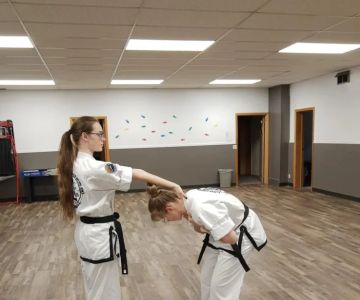
 Master Chang's Martial Arts Durham4.0 (86 reviews)
Master Chang's Martial Arts Durham4.0 (86 reviews) Complete Martial Arts Club of Hershey4.0 (76 reviews)
Complete Martial Arts Club of Hershey4.0 (76 reviews) Susquehanna Valley Academy of Martial Arts0.0 (0 reviews)
Susquehanna Valley Academy of Martial Arts0.0 (0 reviews) Cordova's Taekwondo5.0 (2 reviews)
Cordova's Taekwondo5.0 (2 reviews) Maple Valley Martial Arts Center5.0 (4 reviews)
Maple Valley Martial Arts Center5.0 (4 reviews) Evolve Martial Arts4.0 (59 reviews)
Evolve Martial Arts4.0 (59 reviews)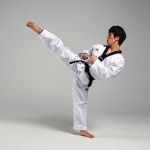 How to Execute a Jumping Roundhouse Kick to the Head
How to Execute a Jumping Roundhouse Kick to the Head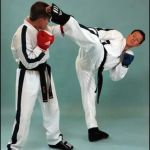 How to Execute a Double Kick Combination in Sparring
How to Execute a Double Kick Combination in Sparring How to Perform a Flawless Axe Kick: A Step-by-Step Guide
How to Perform a Flawless Axe Kick: A Step-by-Step Guide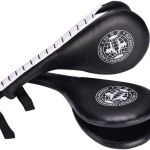 DIY Tae Kwon Do Training Equipment for Home Practice
DIY Tae Kwon Do Training Equipment for Home Practice How to Increase Your Vertical Jump for Tae Kwon Do Flying Kicks
How to Increase Your Vertical Jump for Tae Kwon Do Flying Kicks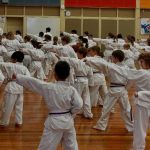 The History of the Tae Kwon Do Peace Corps
The History of the Tae Kwon Do Peace Corps